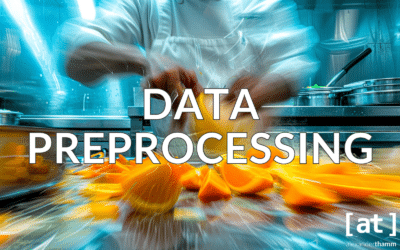Everything that is valuable must be protected, and that includes data. The importance of data in today's world makes it an asset worth protecting, which necessitates data security as a technological concept. This article looks at the nuances of data security and analyses key issues that clarify how data can be protected in today's data-dependent society.
Inhaltsverzeichnis
What does data security mean in the company?
Data security or information security is the systematic practice of Protection of digital information from unauthorised handling, theft or damage. This involves a multi-faceted approach that includes proactive monitoring, data encryption, access controls, etc.
In a company, data security includes all policies, procedures and technologies used to protect digital information from unauthorised access. This also includes protecting against the alteration or destruction of important digital information such as financial records and all other sensitive data relating to the company's business activities.
Data security includes technological as well as human and legal measures so that a company can establish a holistic and functioning data security system.
Technological measures for data security
Some excellent examples of the technological standards of data security include data encryption, biometric authentication and access control.
- Data encryption: Data encryption is used to make data unreadable for unauthorised persons. A robust Encryption algorithm ensures that data that falls into the wrong hands cannot be deciphered, such as the end-to-end encryption of most social and communication platforms.
- Biometric authentication and access control: Sometimes conventional passwords do not provide an optimal Data protectionas they can be guessed. This is where biometric authentication and access controls come into play. They add an extra layer of security to traditional passwords by requiring identity verification. This identity verification is based on human physiological characteristics such as fingerprints, retinal scans, facial recognition technology, etc. They reduce the risk of information misuse in an organisation so that employees can only access the information relevant to their role. Data can access.

Data Mesh: Revolutionising data management. Discover decentralised agility and improved information sharing. How do businesses benefit? Learn more.
Introduction to Data Mesh: How companies benefit from decentralised data management
Human measures for data security
Although most organisations have robust technical measures in place to combat data breaches, human factors represent significant gaps in data security. The Data sharing is an example of the vulnerabilities of human factors in data security. This makes it necessary to educate individuals about cybersecurity best practices and raise awareness of data security issues.
Another manifestation of data insecurity are Insider threats. This is the case when authorised individuals with access to sensitive company data deliberately or accidentally compromise data security. Organisations can combat human threats to data security by establishing robust monitoring systems and conducting background checks on employees. In this way, the organisation can develop clear protocols for the clearance of individuals handling classified information.
Legal measures for data security
Legal and ethical measures to ensure data security are human measures that involve governments and other regulators in the fight against information breaches. Governments and regulators establish data protection regulations to ensure data security. For this reason, there is the General Data Protection Regulation (GDPR) of the EU, which sets standards for the collection, processing, storage and protection of company data. These rules protect the privacy of individuals and organisations from legal consequences.
In addition to legal measures, ethical considerations are also an important aspect of data protection. Ethical considerations ensure that the Responsible data collection and disclosure takes place. Obtaining explicit consent before sharing data is one way of building trust in the handling of data within and between companies.
The Information security aims to ensure the security and protection of data in a corporate environment. This information includes financial data, customer data, account information, intellectual property, etc. If data is not protected, this can lead to an information breach, which manifests itself in data theft, deletion, alteration, leakage, etc., which in turn can have a negative impact on the company's process and reputation.
The importance of data security for the corporate sector
Data security is critical in all areas of business as it relies heavily on digital information and virtual interactions. Therefore, organisations need secure data practices to protect confidential information, maintain trust and protect privacy. This section discusses the importance of data security for the corporate sector in detail:
- Compliance with laws: Compliance with the law is closely linked to data security. Several semi-governmental organisations have functional regulations for the protection of sensitive information. Therefore, non-compliance with these data security regulations can have serious legal consequences, such as heavy fines for a company.
- Customer loyalty and trust: Customers who favour a company trust it with their sensitive data. Customers are more willing to do business with a company if they know their privacy and the security of their data. It would be a breach of trust for a company to knowingly or unknowingly mishandle such information.
- Market advantage and differentiation: Companies that excel in the area of data security have a competitive advantage over their rivals. This is a side effect of maintaining customer loyalty and trust through a robust data security framework. A good reputation for data security gives an organisation an edge over others by attracting customers who care about data security.
- Protection of intellectual property: The importance of data security in business goes beyond the reservation of customer or account data. Intellectual property is exposed to significant threats, ranging from theft to modification. Proprietary information, research projects, commercial data, development information and other corporate transactions constitute intellectual property worthy of protection. It is important to protect the integrity and confidentiality of data that is necessary for the further development of the company.
- Reduction of the financial consequences: The financial consequences have a negative impact on the sustainability and financial stability of a company. Data security measures are a proactive means of mitigating the economic consequences that prevent a business from thriving. Financial consequences include cash losses, legal costs and regulatory penalties.
- Protection of the corporate image: A functioning data security framework safeguards a company's reputation. The reason for this is that data breaches shake the confidence of customers, stakeholders and clients in a company and lead to damage to its image.
- Business continuity: Companies will likely be able to continue operating without data breaches. Data breaches and cyber-attacks disrupt normal business operations and resilience, leading to financial losses and loss of business. Therefore, data security measures such as data backups and disaster recovery plans improve the resilience and continuity of an organisation's business operations.
- Maintaining the integrity of the supply chain: Data security within the supply chain is critical to maintaining the integrity of transactions and protecting confidential shared partner data. This ensures that malicious actors do not exploit organisational vulnerabilities that could jeopardise the company's progress.
As technology advances, so do the activities of malicious actors, making it essential for individuals and organisations to stay one step ahead of cyber security issues with intense vigilance.
What are the 3 principles of data security?
The three principles of data security are confidentiality, integrity and availability, also known as the CIA triad. They are relevant because every data security system must implement one or more of the three principles.
Confidentiality
Confidentiality is the basis of data security and focuses on protecting information from unauthorised access. This means that secret information is only passed on to authorised systems or employees. Most organisations achieve the highest level of confidentiality through encryption, as it converts the data into unreadable forms. Access controls regulate who can access classified information to reduce the risk of unauthorised disclosure. In addition, the confidentiality of information is increased by establishing secure internal and external communication channels.
Integrity
Integrity, one of the principles of data security, is concerned with maintaining the reliability and accuracy of data. The aim is to protect data from unauthorised changes, such as deletions or additions, which could compromise the authenticity of the information. The idea behind data integrity is to make it trustworthy. Organisations use data validation techniques such as hash algorithms, barcodes, checksums, etc. to verify data integrity. They also use version controls to track data changes and quickly detect unauthorised changes.
Availability
Data is considered available if authorised users have timely access to the information when required. This includes all measures that prevent any interruption to access to information. This is where backup systems, mirrored data centres and emergency plans come into play to ensure the constant availability of data. They also ensure the recovery of data to minimise downtime and ensure continuous access to company processes to meet user requirements.

In our article, we show you why good data quality is the key to reliable processes and how you can ensure this for your company:
Differences between data security and data protection
Although data security and data protection appear similar at first glance, there is a clear difference between them when you consider the broader spectrum of digital information protection.
Data security concentrates on the Protection of data against unauthorised access, modification or destruction. It includes measures such as data encryption, monitoring systems and access controls to achieve the three principles of data security.
In contrast, the Data protection a broader set of practices that go beyond securing digital information from external threats. He ensures the use of data in accordance with ethical and legal standards. This includes critical issues such as consent, ethical handling of data, etc.
Data security is part of data protection, while data privacy goes beyond security and relates to the collection, processing and sharing of data as well as rights and privacy protection.

In our blog post, we explain the essential aspects of cloud security and data protection to keep your company safe in the digital cloud.
Provisions of the GDPR for data security
The GDPR (General Data Protection Regulation) provides conditions for the implementation of sound data security practices in organisations in the EU. It emphasises principles such as purpose limitation, data minimisation and the right to be forgotten. It also ensures that companies implement data security measures at a high level.
These measures include encryption, risk assessments and the reporting of data breaches in order to identify and rectify potential vulnerabilities. Companies that do not comply with the GDPR's data protection regulations face severe fines, which can amount to up to 4 % of the organisation's global annual turnover. This forces companies to prioritise data transparency and accountability.
Why is data security important?
Data security is important because it is standardised for all data processing companies. This is because it protects the organisation's reputation and ensures business continuity and regulatory compliance. Below are some other reasons why data security is important:
- Data security utilises data integrity to protect the company's reputation.
- Data security ensures that the company complies with laws and regulations and avoids legal consequences such as fines.
- Data security preserves customer trust, which further boosts business.
Data security measures
Data security measures refer to all protocols for establishing organisational protection against data breaches and threats in order to ensure information security and raise awareness of information security within the company. They include:
- Data encryption: Encryption techniques are used to prevent data from being read by unauthorised persons. It is mainly used in communication channels, databases and storage systems.
- Access controls: They regulate data access to authorised personnel only. Organisations implement access controls based on employee roles or other physiological differences such as facial recognition technology, retinal scans, fingerprints, etc.
- Auditing and monitoring: Regular audits uncover unusual activities and potential data threats. This helps to check the effectiveness of data security measures.
- Training and sensitisation of staff: The education and training of staff in the area of data security increases their knowledge of the need to protect information. This also includes training on data security best practices to protect staff from data breaches.
- Regular data backup: A solid data backup strategy ensures that important information is not permanently lost. This comes in handy when data is accidentally deleted. Organisations should regularly test and validate their data backup systems to ensure their effectiveness.
Who is responsible for data security in a company?
The responsibility for data security in a company is a collective responsibilityin which various stakeholders are involved. Each stakeholder plays a critical role in ensuring data security, which may differ or overlap with that of other employees within the organisation.
The following table shows who is responsible for what in a company in terms of data security.
| Stakeholders | Responsibility for data security |
| Top management | They set the pace for an information security-centred environment and provide resources for data protection. |
| Data Protection Officer (DPO) | He ensures that the organisation complies with data protection laws such as the GDPR. He accesses risks, organises data protection activities and mediates between the company and the data supervisory authorities. |
| IT department | They implement practical data security measures. These measures include data encryption technologies, access controls, security monitoring and general infrastructure maintenance. |
| Legal department and compliance teams | They ensure that the company complies with data protection laws and avoids legal consequences. They also draft and review organisational data protection guidelines, contracts and agreements to protect the company. |
| Employees | They follow and maintain the company's best practices in the area of data security. They take part in data security training and share their findings with top management. |

Data governance enables functioning frameworks and standards for the management, access control and use of big data to optimally exploit the potential of data analytics.
Data Governance: Fundamentals, Challenges and Solutions in Data Management
Data security as a central corporate objective
The importance of data security in today's data-dependent world cannot be overemphasised. It is beneficial for organisations to adopt holistic measures that take into account the three principles of data security. In addition, the best information security measures must include technological measures, human efforts, legal compliance and a commitment to ethical data handling to strengthen the organisational approach to data security.











0 Kommentare